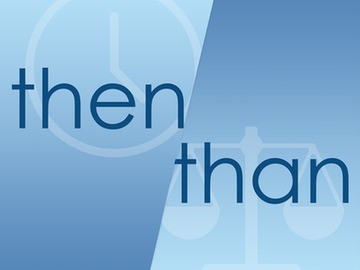“Than” and “then” are two words that often cause confusion due to their similar pronunciation and spelling. Despite only differing by one letter, their meanings and usage are distinct. This article clarifies the difference between “than” and “then,” focusing on the comparative function of “than.”
 then than
then than
“Than”: The Word for Comparisons
The primary function of “than” is to facilitate comparisons between two or more things. It signals a difference or inequality in qualities, quantities, or degrees. “Than” is used after comparative adjectives and adverbs, such as “smaller,” “bigger,” “faster,” “slower,” etc. It forms phrases like “smaller than,” “bigger than,” “faster than,” and the common idiom “easier said than done.”
The blue whale is larger than the humpback whale.
Running a marathon is more challenging than running a 5k.
This new phone is significantly faster than my old one.
Furthermore, “than” follows words like “other,” “rather,” “less,” and “more” to establish comparative relationships.
She would rather dance than sing.
There are more apples than oranges in the basket.
Other than studying, he enjoys playing video games.
The phrase “no sooner…than” signifies that one event happens immediately after another.
No sooner had she sat down than the phone rang.
“Then”: Indicating Time and Sequence
“Then” primarily deals with time and sequence. It indicates when something happens or the order in which events occur. Common phrases using “then” include “just then,” “back then,” “since then,” and “until then.” It also appears in expressions like “and then some,” “now and then,” and “even then.”
Back then, cell phones were much larger.
They finished their homework and then went to the park.
“Then” can answer the question “when?” as both words end with “-en.” It also plays a crucial role in conditional statements (if-then).
If you finish your chores, then you can watch TV.
When did the meeting start? It started then.
Key Takeaway: “Is Than Used to Compare?” – Yes!
In summary, “than” is specifically used for comparisons, highlighting differences between elements. “Then,” on the other hand, relates to time, sequence, and conditional situations. Remembering this core distinction will prevent confusion and ensure accurate usage of these two frequently misused words. Whenever you’re comparing, remember to use “than.”